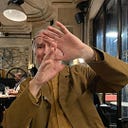Member-only story
Le Placard: questions of research and transmission
Freely improvised and non-academic electroacoustic music {as}[by] urban folk[s] ~ part 6
from: Emergence at the frontiers and in fringes & trenches of contemporary music
Apart from their intrinsic artistic interest, the many editions of Le Placard (especially in the period ranging from 1998 to, roughly, 2013), gathering together a variegated international group of artists, took on the rôle of a kind of informal and self-organised colloquium at an European or even global level, frequented by practitioners and experimenters of improvised electronic music. It brought to the fore what we can best interpret as a broad research effort with a real collective dimension (albeit a non-centralized one) that at times gave rise to genuine phenomena of emergence, that is, distributed innovation. There are few technical practices that we can associate with this or that individual creator. Indeed, going beyond individual experiments on traditional techniques such as the design of electronic circuits or software development (we imagine geeks reclusive in their cellars), the informal, anarchic, Placard community was able to construct truly effective instances of knowledge transfer.
This is relatively obvious since the ubiquitous generalization of global interconnection provided by the internet and web tools, but we can also point at several earlier instances, like the “Experimental Musical Instruments” magazine (1985–1999), published…
